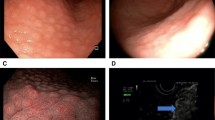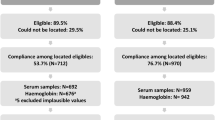Abstract
Purpose
Helicobacter pylori secretory peptidyl prolyl isomerase, HP0175, is progressively identified as a pro-inflammatory and pro-carcinogenic protein, which serves to link H. pylori infection to its more severe clinical outcomes. Here, we have analyzed host HP0175-specific antibody responses in relation to the severity of gastritis.
Methods
The HP0175 gene fragment was PCR-amplified, cloned, expressed and purified by Ni-NTA affinity chromatography. Serum antigen-specific antibody responses of non-ulcer dyspeptic patients (N = 176) against recombinant HP0175 were detected by western blotting. The infection status of these subjects was determined by rapid urease test, culture, histology, and serology. The grade of inflammation and stage of atrophy were scored blindly according to the OLGA staging system.
Results
The recombinant HP0175 (rHP0175) was expressed as a ~35 kDa protein and its identity was confirmed by western blotting using anti-6X His tag antibody and pooled H. pylori-positive sera. Serum IgG antibodies against rHP0175 segregated our patients into two similar-sized groups of sero-positives (90/176, 51.1 %) and sero-negatives (86/176, 48.9 %). The former presented with higher grades of gastric inflammation (OR = 4.4, 95 % CI = 1.9–9.9, P = 0.001) and stages of gastric atrophy (OR = 18.3, 95 %CI = 1.4-246.6, P = 0.028).
Conclusion
Our findings lend further support to the pro-inflammatory nature of H. pylori peptidyl prolyl isomerase (HP0175) and recommends this antigen as a non-invasive serum biomarker of the severity of H. pylori-associated gastritis.


Similar content being viewed by others
References
Graham DY. History of Helicobacter pylori, duodenal ulcer, gastric ulcer and gastric cancer. World J Gastroenterol. 2014;20(18):5191–204. doi:10.3748/wjg.v20.i18.5191.
Cover TL (2016) Helicobacter pylori diversity and gastric cancer risk. mBio 7(1) doi:10.1128/mBio.01869-15
Tomb JF, White O, Kerlavage AR, Clayton RA, Sutton GG, Fleischmann RD, Ketchum KA, Klenk HP, Gill S, Dougherty BA, Nelson K, Quackenbush J, Zhou L, Kirkness EF, Peterson S, Loftus B, Richardson D, Dodson R, Khalak HG, Glodek A, McKenney K, Fitzegerald LM, Lee N, Adams MD, Hickey EK, Berg DE, Gocayne JD, Utterback TR, Peterson JD, Kelley JM, Cotton MD, Weidman JM, Fujii C, Bowman C, Watthey L, Wallin E, Hayes WS, Borodovsky M, Karp PD, Smith HO, Fraser CM, Venter JC. The complete genome sequence of the gastric pathogen Helicobacter pylori. Nature. 1997;388(6642):539–47. doi:10.1038/41483.
McAtee CP, Lim MY, Fung K, Velligan M, Fry K, Chow TP, Berg DE. Characterization of a Helicobacter pylori vaccine candidate by proteome techniques. J Chromatogr B Biomed Sci Appl. 1998;714(2):325–33.
Gong YH, Chen M, Xu Y, Dong N, Sang Z, Liu J, Yuan Y. Subtractive hybridization analysis of gastric diseases-associated Helicobacter pylori identifies peptidyl-prolyl isomerase as a potential marker for gastric cancer. FEMS Microbiol Lett. 2011;320(2):103–9. doi:10.1111/j.1574-6968.2011.02296.x.
Halder P, Datta C, Kumar R, Sharma AK, Basu J, Kundu M. The secreted antigen, HP0175, of Helicobacter pylori links the unfolded protein response (UPR) to autophagy in gastric epithelial cells. Cell Microbiol. 2015;17(5):714–29. doi:10.1111/cmi.12396.
Basak C, Pathak SK, Bhattacharyya A, Pathak S, Basu J, Kundu M. The secreted peptidyl prolyl cis,trans-isomerase HP0175 of Helicobacter pylori induces apoptosis of gastric epithelial cells in a TLR4- and apoptosis signal-regulating kinase 1-dependent manner. J Immunol. 2005;174(9):5672–80.
Tsao MY, Lin TL, Hsieh PF, Wang JT. The 3′-to-5′ exoribonuclease (encoded by HP1248) of Helicobacter pylori regulates motility and apoptosis-inducing genes. J Bacteriol. 2009;191(8):2691–702. doi:10.1128/jb.01182-08.
Basu S, Pathak SK, Chatterjee G, Pathak S, Basu J, Kundu M. Helicobacter pylori protein HP0175 transactivates epidermal growth factor receptor through TLR4 in gastric epithelial cells. J Biol Chem. 2008;283(47):32369–76. doi:10.1074/jbc.M805053200.
Zhu Y, Chen M, Gong Y, Liu Z, Li A, Kang D, Han F, Liu J, Liu J, Yuan Y. Helicobacter pylori FKBP-type PPIase promotes gastric epithelial cell proliferation and anchorage-independent growth through activation of ERK-mediated mitogenic signaling pathway. FEMS Microbiol Lett. 2015;362(7). doi:10.1093/femsle/fnv023.
Amedei A, Munari F, Bella CD, Niccolai E, Benagiano M, Bencini L, Cianchi F, Farsi M, Emmi G, Zanotti G, de Bernard M, Kundu M, D’Elios MM. Helicobacter pylori secreted peptidyl prolyl cis, trans-isomerase drives Th17 inflammation in gastric adenocarcinoma. Intern Emerg Med. 2014;9(3):303–9. doi:10.1007/s11739-012-0867-9.
D’Elios MM, Czinn SJ. Immunity, inflammation, and vaccines for Helicobacter pylori. Helicobacter. 2014;19(Suppl 1):19–26. doi:10.1111/hel.12156.
Dixon MF, Genta RM, Yardley JH, Correa P. Classification and grading of gastritis. The updated Sydney system. International workshop on the histopathology of gastritis, Houston 1994. Am J Surg Pathol. 1996;20(10):1161–81.
Rugge M, Meggio A, Pennelli G, Piscioli F, Giacomelli L, De Pretis G, Graham DY. Gastritis staging in clinical practice: the OLGA staging system. Gut. 2007;56(5):631–6. doi:10.1136/gut.2006.106666.
Mohammadi M, Talebkhan Y, Khalili G, Mahboudi F, Massarrat S, Zamaninia L, Oghalaei A. Advantage of using a home-made ELISA kit for detection of Helicobacter pylori infection over commercially imported kits. Indian J Med Microbiol. 2008;26(2):127–31.
Mohammadi M, Kashani SS, Garoosi YT, Tazehkand SJ. In vivo measurement of Helicobacter pylori infection. Methods in molecular biology (Clifton, NJ). 2012;921:239–56. doi:10.1007/978-1-62703-005-2_26.
Shin CM, Kim N, Lee HS, Lee HE, Lee SH, Park YS, Hwang JH, Kim JW, Jeong SH, Lee DH, Jung HC, Song IS. Validation of diagnostic tests for Helicobacter pylori with regard to grade of atrophic gastritis and/or intestinal metaplasia. Helicobacter. 2009;14(6):512–9. doi:10.1111/j.1523-5378.2009.00726.x.
Kim N, Weeks DL, Shin JM, Scott DR, Young MK, Sachs G. Proteins released by Helicobacter pylori in vitro. J Bacteriol. 2002;184(22):6155–62.
Atanassov C, Pezennec L, d’Alayer J, Grollier G, Picard B, Fauchere JL. Novel antigens of Helicobacter pylori correspond to ulcer-related antibody pattern of sera from infected patients. J Clin Microbiol. 2002;40(2):547–52.
Reynders MB, Miendje Deyi VY, Dahma H, Scheper T, Hanke M, Decolvenaer M, Dediste A. Performance of individual Helicobacter pylori antigens in the immunoblot-based detection of H. pylori infection. FEMS Immunol Med Microbiol. 2012;64(3):352–63. doi:10.1111/j.1574-695X.2011.00920.x.
Acknowledgments
This study was generously supported by a technical assistance grant (IRN-072), which was co-funded by the Islamic Development Bank, Saudi Arabia, and Pasteur Institute of Iran.
Author information
Authors and Affiliations
Corresponding author
Ethics declarations
Conflict of Interest
The authors declare no conflict of interest.
Additional information
Akbar Oghalaie and Samaneh Saberi share first authorship.
Rights and permissions
About this article
Cite this article
Oghalaie, A., Saberi, S., Esmaeili, M. et al. Helicobacter pylori Peptidyl Prolyl Isomerase Expression Is Associated with the Severity of Gastritis. J Gastrointest Canc 47, 375–380 (2016). https://doi.org/10.1007/s12029-016-9849-x
Published:
Issue Date:
DOI: https://doi.org/10.1007/s12029-016-9849-x




